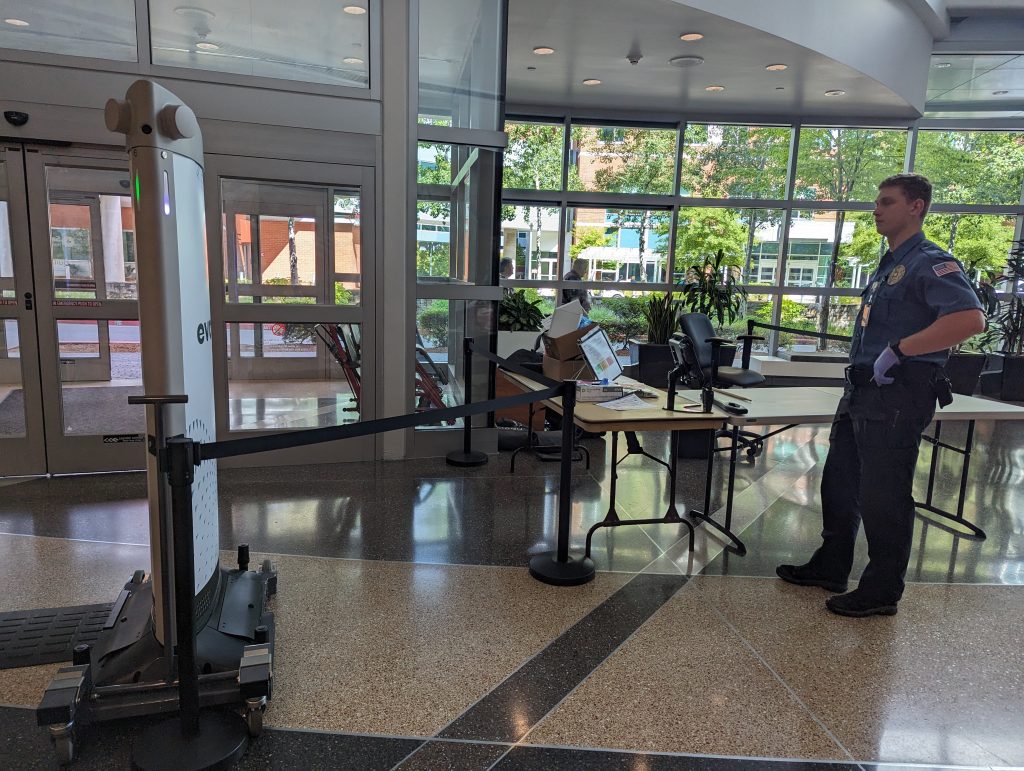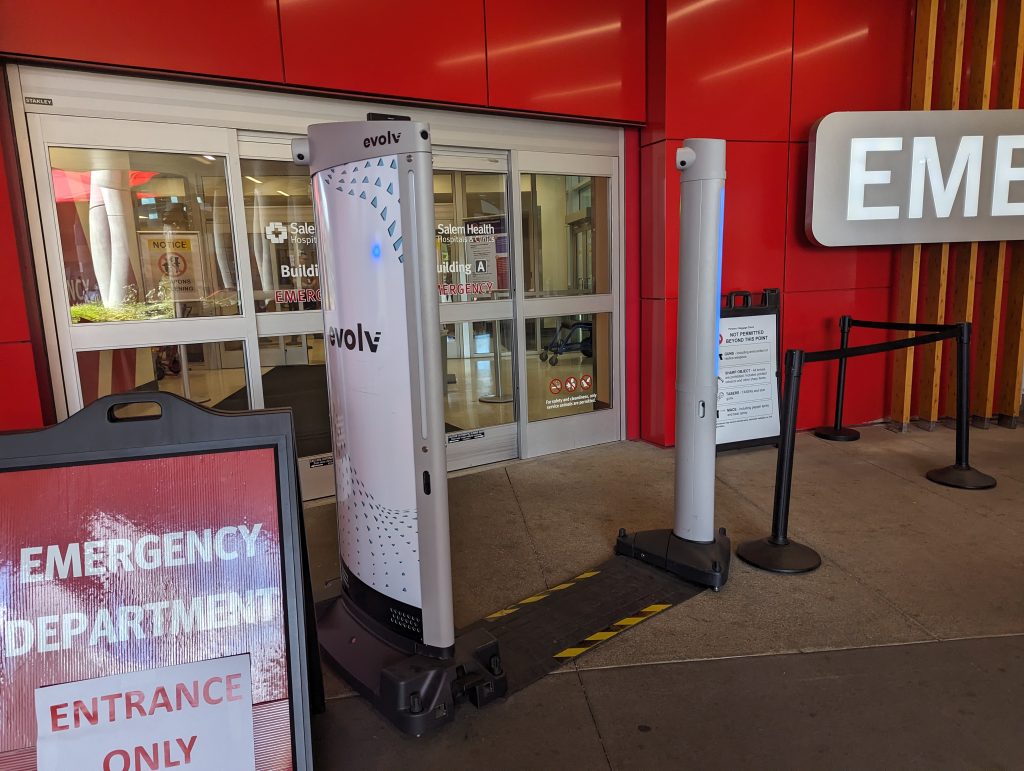Salem Hospital this week began screening visitors and patients for weapons at all hospital entrances as part of an expanded security program following a national rise in threats and violence against health care workers.
The hospital has screened people entering the emergency room using a magnetic wave scanner intended to flag weapons for about a year, but has now added security checkpoints with scanners or wands and bag searches to all entrances on hospital grounds.
As of Thursday, Aug, 24, all visitors and patients are scanned for weapons with either a wand or detector as they enter the hospital. Screenings began last week at Building A, the hospital’s main building.
Cheryl Wolfe, Salem Health’s CEO, said the screenings are part of an effort over the past year and a half to improve hospital security. That has included doubling the organization’s security staff at a cost of about $6 million a year, active shooter trainings and a campaign encouraging employees to report aggression and abuse from patients and visitors.
The expanded security screenings were rolled out following the fatal shooting of a Legacy Good Samaritan Hospital security guard on July 22 in Portland.
“When the murder happened, we came back to the table and said, ‘Are we doing enough and are we moving fast enough in terms of what needs to happen?’” Wolfe said in an interview with Salem Reporter.
Health care is one of the most violent fields of work in the U.S., and health care workers suffer nonfatal injuries on the job more often than in any other profession, according to PBS News Hour.
“What we have seen at least over my career is just this explosion of more and more aggressive, assaultive, behavioral, verbal abuse that happens in the care setting,” Wolfe said in an interview with Salem Reporter.
Those assaults are typically committed by patients or visitors and don’t involve weapons. Salem Health hasn’t had an assault involving a weapon, spokeswoman Lisa Wood said, but staff have been bitten and had objects thrown at them.
Wolfe said the health system has tried to tackle such attacks with a workplace campaign focused on abusive behavior, encouraging staff to report it. While the hospital has to provide care to people who need it, she said they can also trespass visitors causing problems or call police if a patient is being threatening.
“Our staff have really engaged and are reporting more than they ever have,” she said.

At the main entrance to Salem Hospital’s emergency room on Tuesday, patients and visitors walked past an Evolv scanner — a device the company says uses artificial intelligence to flag items that could be guns or knives.
Security screener Tobin Smith pulled aside a man with a pocket knife and explained the hospital’s no weapons policy. Given the choice between returning the knife to his car or leaving it with security, the man proceeded inside, and Smith bagged the knife in a plastic biohazard bag with a claim ticket and the man’s phone number.
RJ Majors, a security supervisor who’s been at the hospital for three years, said the hospital has a longstanding no weapons policy, but is taking more steps now to enforce it. Typically, weapons they find are ones people forgot they had with them.
If someone requires immediate medical attention, Majors said they aren’t stopped at the security checkpoint. Instead, a security employee will escort the patient until they can complete a weapons screening, which may be later if someone is bleeding out or in cardiac arrest.
“We do understand that when you’re coming to the hospital, it’s not always planned,” Majors said.
On Tuesday, a log showed Smith and his coworkers had confiscated two knives earlier in the day. Most people with firearms opt to return them to their car, he said.

The Evolv scanners in use at some hospital entrances have come under criticism after failing to detect weapons at schools, including a knife a student later stabbed a classmate with in Utica, New York.
“When we did our review over a year ago, we knew that there were some problems, but they were still more superior in detection than other products that we looked at,” Wolfe said. A national security consultant Salem Health worked with earlier this month recommended a better weapons detection system that the health organization is planning to acquire, she said.
The detector and checkpoint isn’t the only step that’s been taken to secure the hospital. Majors acknowledged somebody entering the hospital with a goal of causing harm was unlikely to be deterred by the alarm from a weapons detector.
Security guards monitor cameras that record outside buildings and have access to buttons that can lock down hospital entrances quickly, he said.
The glass doors that separate the entry hallway from the emergency department waiting room are ballistic glass, and security are trained to retreat inside with patients in case the building needs to lock down. Majors said that’s what would happen if cameras showed somebody heavily armed and wearing body armor walking toward a hospital entrance.
Weapons screenings are now in place at Salem Hospital, but will be rolled out to other Salem Health clinics, urgent care and their other hospital, West Valley in Dallas, in the coming months, Wolfe said.
Contact reporter Rachel Alexander: [email protected] or 503-575-1241.
SUPPORT OUR WORK – We depend on subscribers for resources to report on Salem with care and depth, fairness and accuracy. Subscribe today to get our daily newsletters and more. Click I want to subscribe!

Rachel Alexander is Salem Reporter’s managing editor. She joined Salem Reporter when it was founded in 2018 and covers city news, education, nonprofits and a little bit of everything else. She’s been a journalist in Oregon and Washington for a decade. Outside of work, she’s a skater and board member with Salem’s Cherry City Roller Derby and can often be found with her nose buried in a book.










